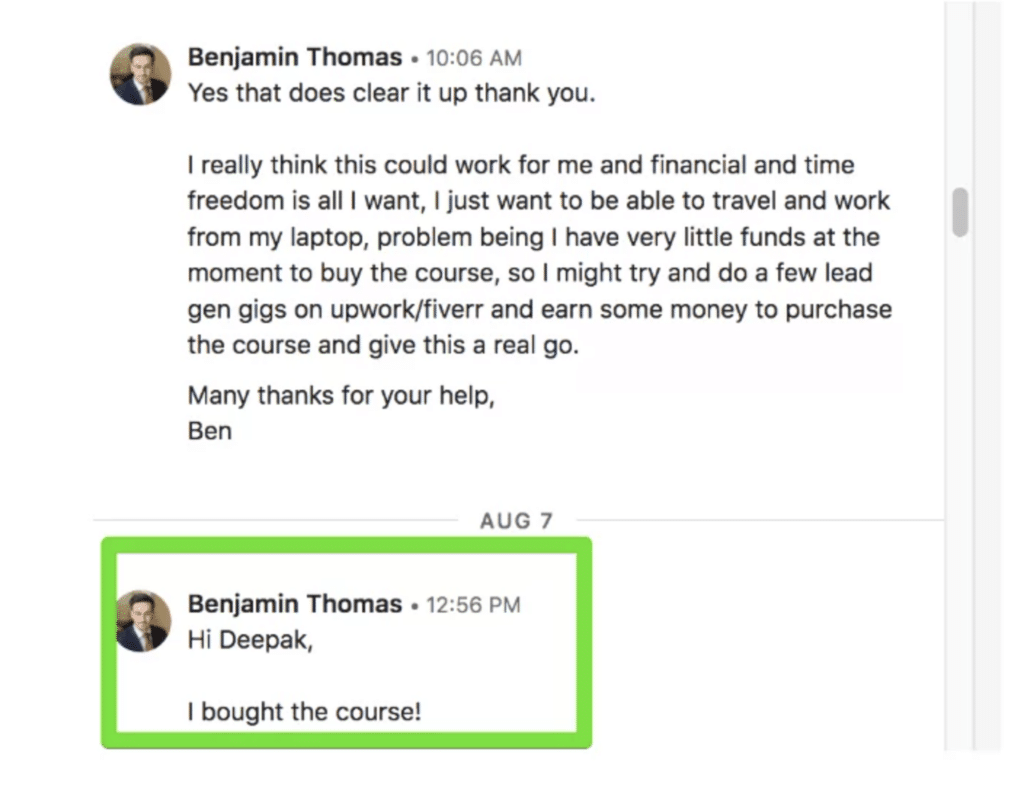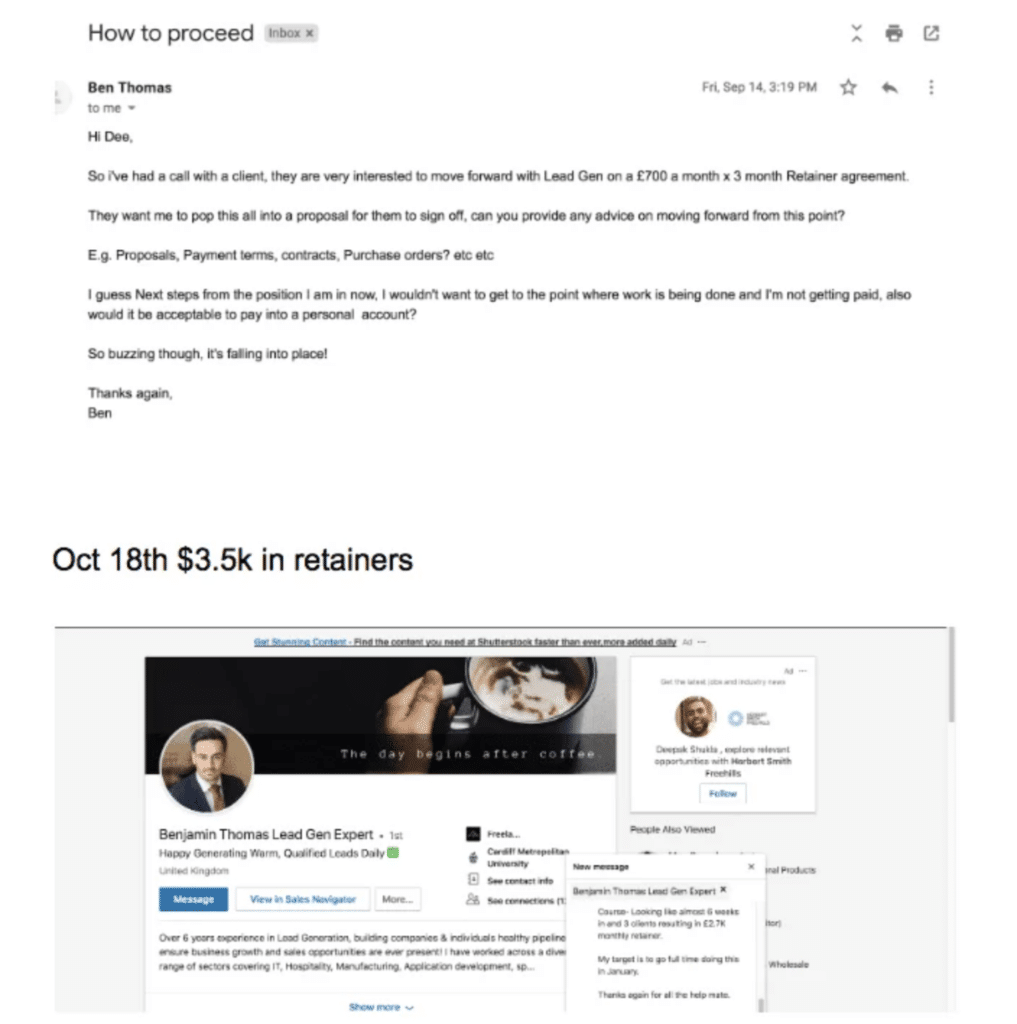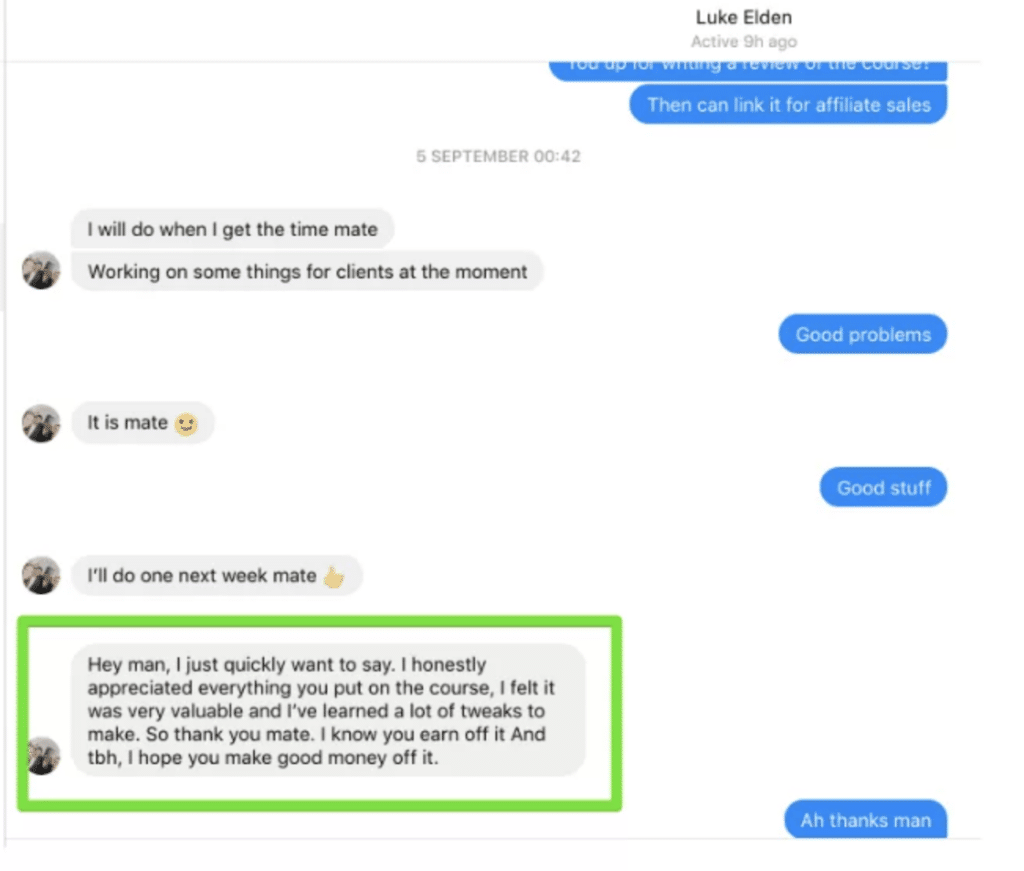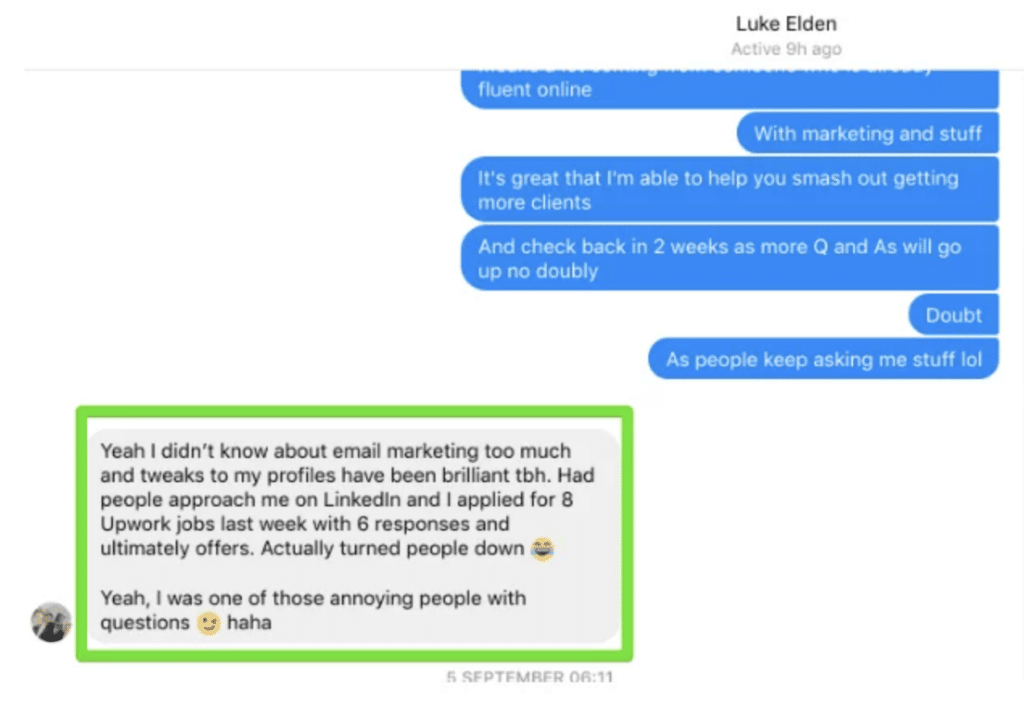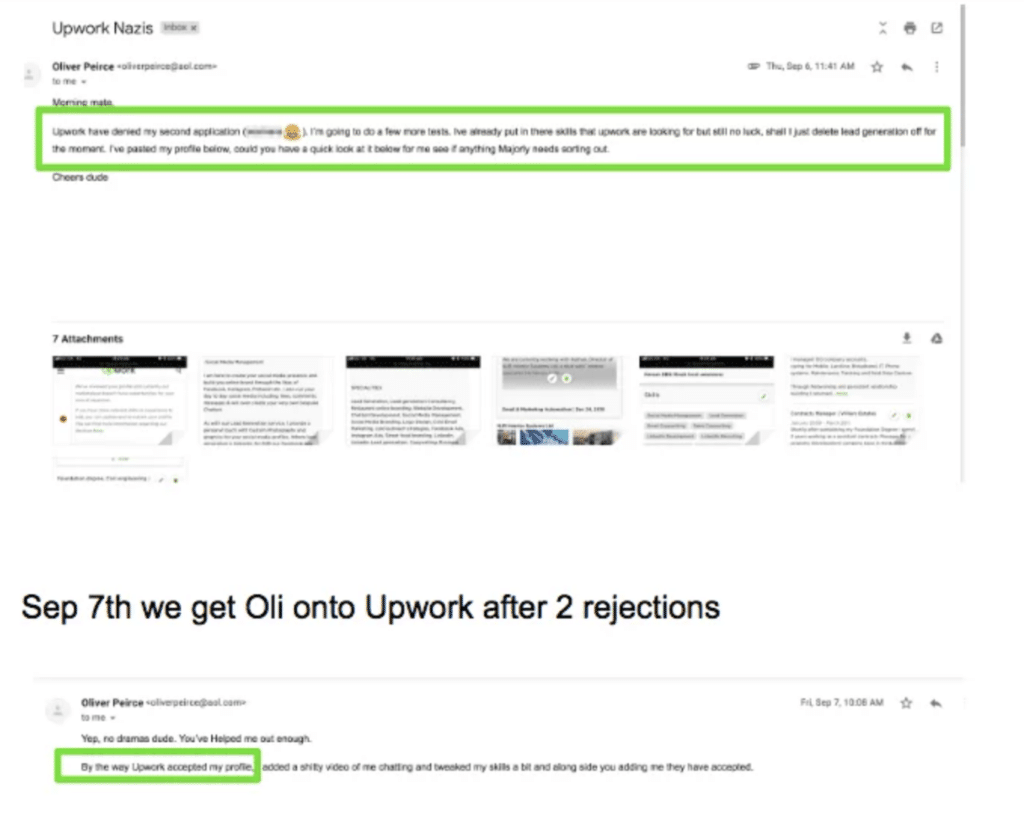Of all the courses I offer, right now the most popular – and dare I say it most successful – is the Secrets of a Six-Figure Lead Generation Consultant course. For those of you who don’t know, it’s an intense – but self-paced – journey through the techniques and blueprints I have used to build Pearl Lemon, my ‘six-figure agency’.
I have many courses about various topics including digital marketing, content marketing, search engine optimisation (SEO). All of these serve people to find new clients, build a landing page, create/improve their lead generation strategy. As a freelance consultant, I try to bring as much to people as I can so that they could build their own business or startup and become an entrepreneur.
When dealing with online courses of any kind – especially those that cost money – people naturally want a little bit – or a lot – of information and reassurance about what might make it worth the investment. Understandable. They also like to hear from people who have already taken the course so they can see whether or not it actually works. Also, hugely understandable. I’d worry about someone who was not this cautious. No one likes to waste money, especially me.
So today I wanted to share a few case studies, the experiences of a few of the students who have worked their way through the Six Figure Agency Secrets Course already and are out there putting what they have learned into (major) action.
Benjamin Thomas
Benjamin – Ben – is a great guy from Cardiff who was one of the first guys to contact me with questions about the course soon after it was launched:
Not going to lie either, this was exciting for me, as this was a chance to help someone who was basically in the same position as I was not too long ago.
So Benjamin started the course – while still working, as that is the way the course is set up, you can follow it at your own pace and revisit it as and when you need to, even long after you’ve been through the first time.
Just a couple of weeks in, Benjamin had created – and sent – the email templates I suggested, and was getting results. And not too long ago, he updated me on just how he’s doing right now:
And made this great video.
I’m really looking forward to watching Ben as he moves on, especially as he reminds me a lot of myself!
Luke Elden
Luke’s a special dude. He actually turned down a professional football contract to follow his business dreams instead. So trust me, this was a big deal for me too, as he was putting his faith in me to help him.
But I’ll let him tell his own story
These were his initial reactions a few weeks into the course, which were, I was delighted to hear, very positive.
Even better, as we were communicating, things were starting to look really good for Luke.
Luke’s smashing it and even turning clients down. This is a dude to watch, mark my words.
Oli Peirce
Oli is another ‘Deepak Success Story’ I’m particularly proud of. This guy is a grafter. He’s married, he had his own mobile food truck business and, because he needed to ramp his income had also just opened a social media marketing business. He needed leads because financial concerns became even more pressing when he and his wife discovered Baby #2 was on the way. Still, he did his due diligence before he signed up (see below) And just so you know, I have no problems receiving and answering emails like these. Because I totally understand them.
Hi Deepak,
Don’t take offence to this question I’m just curious and as you say its hard to pick the legitimate mentors and the Fake “Gurus”.
I am most likely to join your program but I’m wondering that if your program is so easy to adopt and make quick returns why don’t your staff do the same and start up their own company?
Kind Regards
Oli
I answered. We talked. He even talked to a couple of my staff. He signed up. And there were issues along the way. Upwork can be a great place for someone like Oli to find great clients, but it can also be tough to break into without a certain amount of solid, verifiable experience. A lot tougher than it was just a few years ago. But we worked our way through that:
And not only is he doing well personally, but he’s also even been offering advice and guidance to others in the private Facebook group that my course students interact in. WHAT A DUDE.
There is a wealth of information out there about all the nitty-gritty details of the sales process, inbound marketing and thought leadership. All you have to do is do some research and you’ll be a top decision maker in no time!
These are the stories of just three of my star pupils. You can find some more personal testimonials from those who have taken the course on my YouTube channel here. If you want to learn more, and sign up, you can do so here. And if you want to reach out, ask questions, chat about the course and what it might be able to do for you, by all means, do that too. I’d love to hear from you.
Talk later
Deepak
faqs
A virtual sales meeting is precisely how it sounds. It’s a sales meeting that’s performed over a virtual platform like Zoom, Microsoft Teams, or GoToMeeting. That doesn’t mean that a virtual meeting is a walk in the park if you can master an in-person sales meeting, however. When you’re trying to lead a virtual sales meeting, you must understand the technical problems and communication difficulties that can arise from an impersonal format like video calling. To combat this, there are some things you can do to make sure your virtual sales meeting runs more smoothly:
- Send a Google invite that includes the meeting time and link, so everyone’s on the same page.
- Prepare yourself beforehand. Making sure that your internet connection is working correctly, you’re centred within your camera frame, and you’re looking at the camera when you speak are some simple preparations that will go a long way.
- During the meeting, make sure you provide a comfortable environment where everyone feels free to contribute their ideas and trusts you as a sales leader.
There are plenty of ways to make virtual sales meetings fun, and you shouldn’t feel restricted creatively by the format. Here are some easy ideas of how to make your subsequent virtual sales meeting a blast for all involved:
- Make it an event – The virtual sales meeting doesn’t just have to be a meeting. You can make it an exciting get-together with your employees by making it a costume-themed gathering, a cocktail party, or a lunch chat. People are always more likely to have fun at a virtual event when there’s a fun twist added to it.
- Provide awards or incentives – Take some time out of your meeting to award an employee who’s been doing great work lately, or you can maybe reward the first five people who show up for their punctuality. Any award or incentive to get your audience involved will go a long way.
- Take a break – If your sales meeting is going to drag on a while, put an intermission in the middle of it to give your employees some time to stretch their legs and take a break.
If your audience is bored or uninterested, their body language and nonverbal mannerisms may be more subtle and trickier to notice than in an in-person meeting. When you’re conducting a virtual sales meeting, you must always focus on your body language and nonverbal mannerisms, so you communicate that you’re interested in the client first and foremost. Not only will your sustained interest be more attractive to your audience, but your sustained focus will make it easier for you to practice active listening and pick up on nonverbal cues from your audience.
You’ll also want to keep your messaging concise and direct. Your audience will forget a lot of what you say by the time the meeting’s over, but compressing your points into short, easy-to-digest bullet points will engage your audience by giving them something simple to remember.
If you haven’t checked the 2 FAQs above on how to make your sales meetings fun and engaging, then those will provide great tips on how to create meetings that will motivate your sales team to do their very best every day.
Another great way to motivate your sales team is to be empathetic to their struggles. Generating leads and working overtime to drive up revenue for a company is hard work, so demonstrating that you understand where your team’s coming from will go a long way towards them working their hardest.
As we’ve said before, virtual selling’s a whole different ballgame. You’ll want to practice active listening, which means you’re constantly paying attention to the client’s tone of voice, body language, and general demeanour. These observations will give you valuable insights into how your meeting is going, allowing you to either continue with your planned strategy or adapt it to fit the client better.
Another important virtual selling skill is knowing the platform you’re using inside and out. You don’t want any technical difficulties or technical ignorance to impede the points you’re trying to make with the client. Further, suppose you’re able to demonstrate that you can perform technical tasks like sharing your screen quickly. In that case, it will instil a high level of professional confidence in the person that you’re trying to engage.


